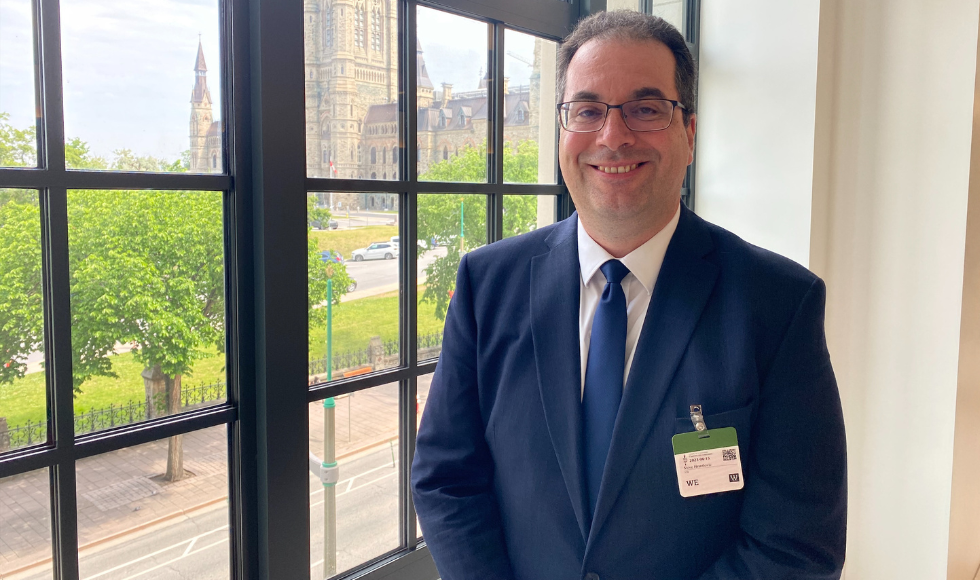Task Force Report Identifies Five Key Areas for Supporting Graduate Students
A significant step forward in supporting graduate students has been taken with the release of the Task Force on Graduate Funding report, which makes recommendations along five key themes that emerged during extensive cross-campus consultations.
The report, submitted to McMaster’s provost and vice-president (Academic), Susan Tighe, on March 11, is the result of the thoughtful, comprehensive and evidence-based approach taken by the Task Force.
“Graduate students are important contributors to McMaster’s academic mission and I look forward to working with university leaders to review the recommendations and to add to the changes already made to enhance graduate student support,” says Tighe. “The report underscores our commitment to graduate students and ensuring that McMaster continues to uphold our tradition of excellence in graduate education.”
The Task Force was chaired by Steve Hranilovic, vice-provost and dean of Graduate Studies, and included six Master’s and PhD students representing all Faculties, six Faculty associate deans and McMaster’s deputy provost.
Early in their work, Task Force members identified some actions that could be taken immediately, and these were ratified by Graduate Council and McMaster’s Senate and implemented at the end of the 2023 Spring Term.
They included policy changes to remove limits to on-campus employment and an increase to the minimum stipend for all full-time/in-time PhD students at McMaster, which raised their minimum stipend to $17,500 plus tuition, up from $13,500 plus tuition. The change has benefited seven per cent of PhD students.
The university also committed to consistently update and to publicly share aggregated data on graduate student funding, which makes McMaster one of the few universities across Canada to do so.

These initial actions and the subsequent report were the result of a comprehensive consultation process undertaken by the Task Force that underscored members’ commitment to inclusivity.
“The insights gathered from our consultations have been invaluable in shaping the recommendations outlined in the report,” says Hranilovic. “We are confident that these recommendations will help advance graduate student success at McMaster.”
Representatives from various sectors of the McMaster community, including the Graduate Students Association, faculty, staff, and relevant university associations took part in the extensive consultation process.
Task Force members heard directly from McMaster community members at 19 round table meetings, the on-campus town hall and through the online feedback form, which was active between February and October 2023.
Five overarching themes emerged from the consultations: Financial Struggles, Clarity on Funding Packages, International Student Barriers, Graduate Funding Adjustments Following Major Scholarships, and the Four-Year Funding Model for PhD Students.
In June 2023, toward the end of the consultation process, Hranilovic took the issue of graduate funding to Parliament Hill. He told members of the House of Commons Standing Committee on Science and Research (SRRS) that additional federal government funding is clearly needed to support graduate students and to have financially sustainable institutions.
He reminded Standing Committee members that federal grants for master’s and PhD students have not increased since 2003.
Joseph Antwi-Boasiako, a PhD candidate in the Faculty of Social Sciences and a Graduate Council Student Representative, says having students work collaboratively with associate deans on the Task Force helped broaden everyone’s perspectives.
“Having us all on one table helped the Task Force reach a common understanding,” Antwi-Boasiako says.
Another Graduate Council Student Representative, Xiaobing Li, a PhD candidate in the Faculty of Science, says the work was “enlightening.”
“There were lots of challenges that we as graduate students don’t normally consider. One of the biggest was understanding … where exactly graduate funding is coming from,” Li says. “Another big one is redistribution. As a grad student, I was never made fully aware of the importance of redistribution and the role it plays in funding graduate students overall.”
To Melanie Heath, associate dean, graduate studies, Faculty of Social Sciences, the work she contributed to on the Task Force will have a ripple effect across campus.
“Publicly releasing aggregated graduate funding data will provide the university and our students with a reliable yardstick year over year and facilitate open and transparent discussions across the university,” she says.
Steve Hanna, vice-dean and associate dean graduate studies, Faculty of Health Sciences, and a Task Force member, says McMaster’s goal will always be to ensure that financial barriers do not keep excellent scholars from studying here.
“The report establishes a crucial framework to ensure that students, faculty, and programs have clear and common expectations about funding,” Hanna says. Prospective students and faculty will know what to expect when considering an offer of admission and be in the best possible position to plan their finances.”
While the report’s submission is a milestone in the effort to support graduate students, McMaster’s provost says the work will be ongoing.
“We are committed to the well-being and success of our graduate students.”

